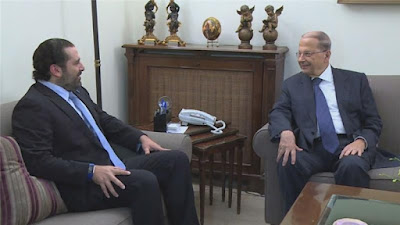Saad Hariri, the new Prime Minister, with president Michel Aoun (right). (Foto Al Jazeera)
Lebanon on Sunday acquired a new 30-minister government led by Saad al-Hariri, bringing together the entire political spectrum except for the Christian Phalangist party that rejected the portfolio it was offered.
The new cabinet, which was announced on state television, will keep Gebran Bassil as foreign minister, Ali Hassan Khalil
as finance minister and Nouhad Machnouk as interior minister.
New portfolios include an anti-corruption post and, for the first time, a minister of state for women's affairs. Hariri said the Phalangist Party had been offered a minister of state post but had turned it down.
Hariri was nominated to form Lebanon's next government on 3 November, after the election of Michel Aoun to the country's president after a two year vacuum, but the process was seen as likely to be
hampered by deep differences with Hezbollah, an influential Shia movement. Hariri, 46, is anti-Syria and a fierce opponent of Hezbollah, members of which have been accused by an international court of involvement in his father's 2005 assassination. In the Hebollah also got two ministers in the government.
Hariri also announced the establishment of a state secretariat for refugees, and called on the international community "to take
responsibility for helping our country bear the burden". Lebanon, a country of four million, has taken in about one million Syrian refugees.
Hariri was nominated to form the government after a two year stalemate in Lebanese politics was ended when, after tens of unsuccesful attempts to elect a president, in October he backed Michel Aoun. Aoun, a former head of the armed forces and briefly a prime minister during Lebanon's 1975-1990 civil war, was a staunch opponent of Syrian military presence in Lebanon. But he shocked many when he, in 2006, a year after his return from exile in France and after Syria pulled its troops from Lebanon, broke away from Hariri's 14 March Movement and with his ''Free Patriottic Movement'' joined forces with Hezbollah and Amal in the
oppositional ''8 March Movement".
Lebanon is due to hold parliamentary elections in May 2017, the first legislative vote in eight years.
The current parliament - elected in 2009 - has extended its own mandate twice amid fierce disagreements over revamping Lebanon's
electoral law.
-


.jpg)



No comments:
Post a Comment